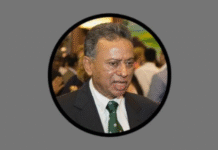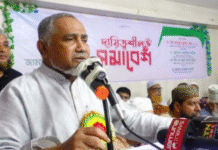For the sake of a successful election
 As the election nears, the political arena grows more heated by the day. BNP remains with its back against the wall, while the ruling Awami League and its allies campaign in full swing. The entire country is plastered with their posters and banners. Their candidates, possible candidates, and supporters are spending money like water. And since the election commission has not announced the election schedule as yet, the cabinet ministers are campaigning during their official tours too, glibly avoiding any violation of the election code. Leaders and activists of the main opposition political party are enmeshed in a multitude of cases, negating any level playing field in the election fray. Even so, the people still hope that the election is held in a free and fair manner.
As the election nears, the political arena grows more heated by the day. BNP remains with its back against the wall, while the ruling Awami League and its allies campaign in full swing. The entire country is plastered with their posters and banners. Their candidates, possible candidates, and supporters are spending money like water. And since the election commission has not announced the election schedule as yet, the cabinet ministers are campaigning during their official tours too, glibly avoiding any violation of the election code. Leaders and activists of the main opposition political party are enmeshed in a multitude of cases, negating any level playing field in the election fray. Even so, the people still hope that the election is held in a free and fair manner.
Questions, however, arise in the mind of the public and the political analysts, and also in the media as to whether the environment is conducive for the election. While fingers are pointed towards the election commission in this regard, it is not in the commission’s jurisdiction to create such an environment until the schedule is announced. There are no legal bindings in this regard and so the ruling party people have a free hand.
It is the responsibility of the government and the political parties to ensure a proper pre-election environment. However, the onus is certainly more on the government’s shoulders. The government is the strongest most important support of the election commission. The commission can approach the government at any time to discuss any complexities it may face regarding the elections.
Election management is a vast area, an important element of electoral governance. This may be a relatively new subject in our country, but there has been ample research on this in developed countries. The election commission is responsible for election management and implementation of the law. The judiciary remains active within the sphere of electoral management.
All involved in the election must consciously endeavour to render the election free and credible. The commission is the central body in electoral management and must be active throughout the election period. The election period includes the pre-election period, the election period and the post-election period.
Any government formed through a faulty election is known as a hybrid democratic government. It invariably turns autocratic. Dr Pippa Norris, professor of comparative politics at the Kennedy School in Harvard University, maintains that such a government cannot be fully democratic. And that is why it endeavours to ensure to come back to power through the next election. It proceeds towards a faulty election, dragging along with it all other institutions of the state.
Research has pointed out that the indications of a failed election are visible on three levels, beginning from the pre-election period. Dr Pippa Norris and others explain that there are several factors as to why an election is a failed one. These factors are deliberately created to impair the opposition’s election preparations or to keep them away from the election. Various obstacles are placed in the path of any strong candidate of the opposition camp to disqualify them from contesting in the polls. Constituencies are demarcated in favour of the government party, media freedom is curbed or the media is lured into the ruling camp, the voters’ list is not updated or amended and so on. All this mostly takes place at the pre-election stage.
Other manipulations include: 1. Scaring the voters before the election; 2. Using the administration for campaigning in favour of the ruling party; 3. Distributing money directly or indirectly among the voters; 4. Not giving the opposition equal space in the media; 5. Election officials not treating all equal due to party loyalty; and 6. Creating an environment so that the opposition boycotts the polls. All this takes place during the election campaign period.
Unlawful activities also take place during the voting or counting of the votes. This also leads to a failed or a faulty election. Such activities include: 1. Instilling fear in the voters so they are dissuaded from voting; 2. Taking over the booths and snatching away the ballot papers; 3. Slow pace of voting; 4. Supplying an insufficient number of ballot papers; 5. Distributing money; 6. One voter casting more than one vote; 7. Not posting the voting stations at convenient places. Other factors include bias of the law enforcement agencies, failure of the election commission to exert itself, and unscrupulous counting of the votes.
It is the election commission that is constitutionally responsible at this stage of election management. The government too has an important role. A faulty election system leads to a faulty election and the results are not accepted at a national or an international level.
The judiciary is one of the most important institutions of electoral management. It is vital to resolve all election conflicts within the shortest time possible. If not, the election will be faulty and anarchy will emerge. The election commission is weak without judicial support. If the judiciary can function independently, the election commission can be strong. The strongest support for the election commission in India is the judiciary, the Supreme Court is particular.
Local and international observers evaluate an election based on all the factors which lead to a failed or a faulty election. That applies to us as well. We hope that the coming election will be free, fair and credible, with the full support of all political parties, all concerned institutions and all bodies involved in electoral management.
* M Sakahwat Hossain is a former election commissioner. This piece, appearing in Prothom Alo print edition, has been rewritten in English by Ayesha Kabir.









